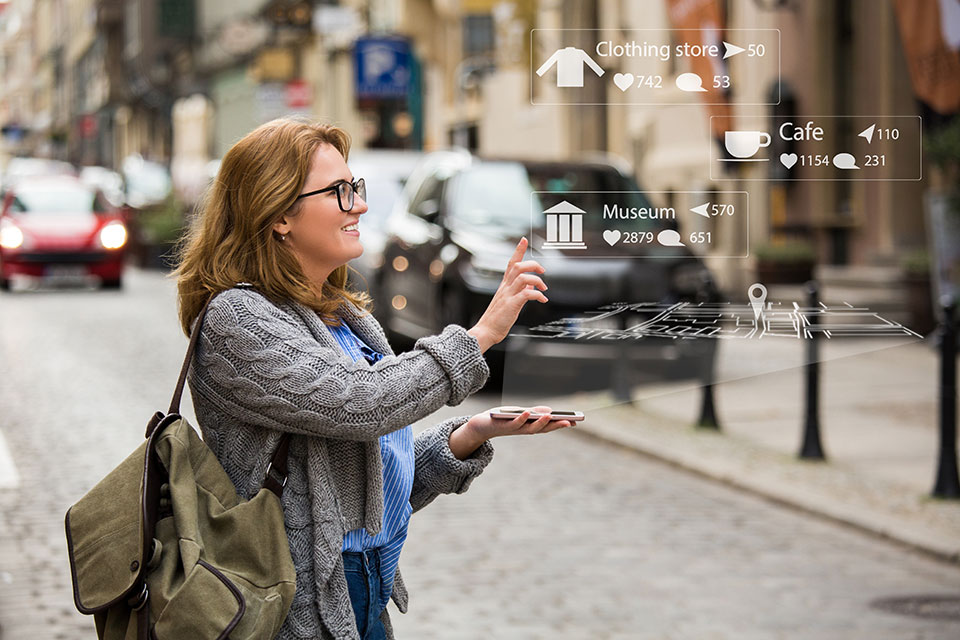Augmented Reality: The Key to The Online Storefront

Thinking back to a time before the sweeping COVID-19 pandemic, there was a lot of talk about the rising importance of e-commerce. Its prominence had begun to proliferate in the late 90s as first-mover businesses rushed to meet a growing tech-savvy Millennial population online. With global e-commerce retail sales projected to hit $4.9 trillion by 2021, the pandemic is the highly flammable oil thrown into the eCommerce growing bonfire.
The evergreen question for marketers, CMOs, and CEOs alike revolves around how to convert interested, prospective buyers over into “paying customers.” As CEO of a Virtual Reality and Augmented Reality company, I’ve observed firsthand how COVID-19 has allowed Augmented Reality (AR) to catch its big retail break. In an environment where retailers need to engage customers from afar. I foresee the implications of using AR as a means of decision architecture or the construction of an environment that encourages certain audience actions, to influence consumer decision making.
What is Augmented Reality?
The term Augmented Reality itself raises suspicion amongst a lot of people who perceive it as an abstract, futuristic concept. However, considering it is projected to grow to more than 18 billion U.S. dollars by 2023, now is the time for business leaders and consumers alike to understand AR.
In simplest terms, AR is the real-time integration of digital information within the physical environment. The popular Snapchat filters are a common example of using AR to overlay digital graphics onto a person’s face or their settings. Another place people more than likely to have encountered AR is through the popular game Pokémon GO. The game, which was launched in 2016, involved using a smartphone to find Pokémon creatures hidden digitally in the real world. While at first glance these uses seem to be merely entertaining, AR’s applications are constantly evolving. AR’s potential business applications are profound: By merging digital elements with a physical world, retailers (and all other companies) can steer people to carry out certain behaviors.
A recent study from Oxford University and AR company QReal found that AR can increase restaurant sales. When comparing a traditional menu to an AR menu, one which shows lifelike 3D models of delicious dishes, more customers would order food if they saw it in AR first. According to the study results, “Participants were significantly more likely to order a dessert if they viewed options in the AR menu (41.2%) versus the control menu (18%).” Humans have evolved to depend on their senses. Instead of reading about a product and leaving it to vague interpretation, AR enables audiences to completely visualize a product. If they like what they see, they’re more likely to buy.
Decision Architecture
As a CEO, I know that what’s important is knowing what is moving markets by understanding what prospective and potential customers are looking for and how to align your company with their interests, accordingly.
When viewing AR as a tool for virtually structuring how people interact with your products and services, the findings of Oxford University’s research are huge! Pre-COVID, physical in-store or in-restaurant experiences (such as those of Tiffany and Co. and Lush) were real business differentiators because of the connection they’d foster with customers. In our increasingly isolated and growingly pixelated world, this customer experience has pivoted to be online-first. If companies want to remain relevant, they need to be where the customers are and these days they are online.
AR provides an invaluable means for guiding individuals to interact with your product and triggers a greater likelihood for follow-through purchases. AR for marketing and advertising is no longer a sole functional business level concern- it’s directly impacting sales and positive consumer sentiment, both of which are (or should be) of concern to CEOs across any industry.
Value of AR
Coincidentally, Augmented and Virtual Reality lie at the very heart of my company, The Glimpse Group. We enhance products and services across various industries through our 8 subsidiary companies, one of which focuses specifically on personifying marketing tactics to strengthen brand identities. Companies are increasingly recognizing the value that AR reaps for their brands in the long term through its ability to spur awareness, increase engagement, and stand out in the eyes of consumers:
- Brand Awareness: Ben and Jerry launched a new ice cream flavor through a fun and interactive AR filter on Facebook. By having people catch marshmallows in their mouths, the company was able to hook in their audience and seamlessly promote their new product in the process.
- Engagement: Together with The Glimpse Group, eyewear manufacturer Bolle created an interactive AR filter to bring customers closer to their new Phantom goggles while mitigating the feeling of unease when committing to buying items online due to COVID. The experience allows customers to view the goggles on their faces, as well as giving them a near realistic idea of how they would view their surroundings with the goggles on, using the rearview camera.
- Wow-factor: Print media isn’t dead, especially when AR has something to do with it! AdWeek partnered with Glimpse in 2018 to debut M&M’s Super Bowl LII spot by augmenting their Super Bowl cover for the first time. By pointing a smart device towards the cover, an animation and video appear on the screen, making the already standout-Super Bowl-event that much more fresh.
Why CEOs should pay attention to AR
Oftentimes, CEOs resist adapting current strategies to better fit a fluctuating external environment because of an attachment to a previous way of doing things. The issue of this management view lies in its perception of the company as the sole driver of its fate. In reality, the company is one of many in a sea of rolling currents that dictate the direction it’ll be facing. The latest current: coronavirus. The current direction: an emphasis on e-commerce and online advertising.
It’s pivotal for CEOs to understand the importance that Augmented Reality plays by feeding into an emerging need to stay connected with consumers in a crowded virtual space. Regardless of whether this pandemic is a short-term event or is here to stay, the capability of going beyond video and 2D modes of customer interaction will be the newest metric of determining business success.
If you want to learn more or you want to meet in AR, please send me a message!
Written by Lyron Bentovim.
Add CEOWORLD magazine to your Google News feed.
Follow CEOWORLD magazine headlines on: Google News, LinkedIn, Twitter, and Facebook.
Copyright 2024 The CEOWORLD magazine. All rights reserved. This material (and any extract from it) must not be copied, redistributed or placed on any website, without CEOWORLD magazine' prior written consent. For media queries, please contact: info@ceoworld.biz








